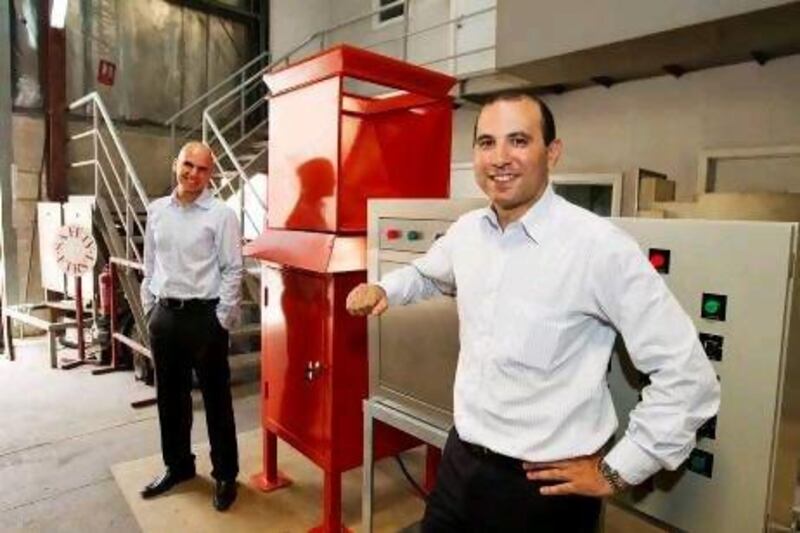DUBAI // Recycling will soon be as easy as pushing a button - if a Dubai company has its way.
Bosses plan to seek a US patent for a device that can separate recyclable materials and dump them into the appropriate bin -making it easier for people to be eco-friendly.
Users can select paper, plastic, glass, metal or general waste, simply by pressing a button on the control panel next to a rubbish chute.
The waste must still be separated before being deposited in the chute.
The machine will soon be operating in buildings in Abu Dhabi. It is expected to be up and running at the capital's Central Market this autumn, followed by the New York University Abu Dhabi.
"The lack of recycling in the country is because every single system or process available here does not facilitate people's daily habits," said Mostafa Nassar, the business development manager of WMS Metal Industries, which specialises in building rubbish chutes for high-rise buildings.
Recycling is not widely available on a door-to-door basis. At present you must drive to a waste collection point and these can be far away.
This deters all but diehard environmentalists, said Mr Nassar.
"You have to go out of your way to recycle here," he added.
With recycling rates below 10 per cent, the UAE is struggling to find the best way to deal with the ever-growing mountains of waste produced daily.
WMS hopes to make recycling much easier for the public, and profitable for building owners.
Mr Nassar and his older brother, Mohamed Nassar, the managing partner of the company, have developed the waste-separator system over the last year.
The separator is essentially a large metal box or cylinder installed at the end of a rubbish chute. Inside this is a metal head.
"The head turns, directing the garbage to different trolleys at the end of the chute, depending on which button is pushed," said Mohamed.
Yesterday, he showcased the device - an orange metal box about two metres tall. Its shape can vary depending on the building, as can the number of waste categories on the electronic panel controlling it.
Landlords can decide to separate only recyclable waste such as glass, plastic, metal and paper from general rubbish. Others may be more specific, separating different categories of recyclable materials.
"Up to six fractions, there is no problem," said Mohamed.
Landlords can collect recyclable waste and sell it to processing firms. The company has calculated that a 20-storey building with eight apartments per floor can generate about Dh7,000 a month from recyclables. For landlords with many buildings, this could be a comfortable stream of revenue, the brothers said.
The system has panels on top of the waste trolleys to stop people stealing the recyclable material. The company claims that some building personnel in the UAE sell the materials for personal profit.
The device will also feature a tracking system so landlords can check if tenants have separated their waste conscientiously.
Later this month, the company plans to file a patent with the US Patent and Trademark Office.
Mohamed, an Egyptian who was raised in Abu Dhabi, said the issue of developing technology locally is important.
In 2009-2010, 321 patents in the US were filed by people or companies in the Arab world. Patent applications from India alone totalled more than 10,000, he said.
"What we are used to here is just doing what everyone else does," he said. "We are not very entrepreneurial as a region."
But more people are starting to tap into their creativity and take "more responsibility for their destinies", he said.
"If you sit down at home for five or six days and look for a new idea, I am sure you will find it," he said. "We were just lucky to find an idea related to the sector we work in."





